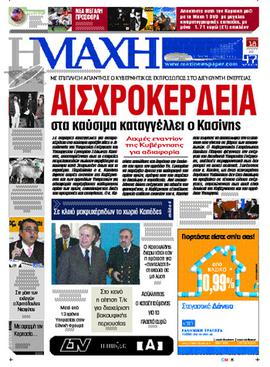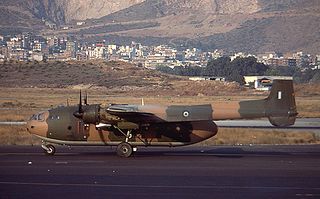
The Cyprus problem, also known as the Cyprus conflict, Cyprus issue, Cyprus dispute, or Cyprus question, is an ongoing dispute between the Greek Cypriot community which runs the Republic of Cyprus and the Turkish Cypriot community in the north of the island, where troops of the Republic of Turkey are deployed. This dispute is an example of a protracted social conflict. The Cyprus dispute's causes stem from ethnic Greek nationalist ideology, Greek-Cypriot sentiment, the Megali Idea and Enosis, and some of the ethnic Turkish peoples' desire for the partition of the island of Cyprus through Taksim as a means of protection of their people by what they considered to be the threat of Greek-Cypriots.

Makarios III was a Greek Cypriot archbishop, primate, statesman and politician, who served as the first President of Cyprus between 1960 and 1977. He was also the Archbishop of the autocephalous Church of Cyprus from 1950 to 1977.

Georgios Grivas, also known by his nickname Digenis, was the Cypriot founder and leader of the Greek and Greek Cypriot paramilitary organisations Organization X (1942–1949), EOKA (1955–1959) and EOKA B (1971–1974).

Cyprus was part of the British Empire, under military occupation from 1914 to 1925, and a Crown colony from 1925 to 1960. Cyprus became an independent nation in 1960.
Nikos Sampson was a Cypriot journalist, militant and politician, who was installed as acting President of Cyprus during the 1974 coup.

The Turkish invasion of Cyprus began on 20 July 1974 and progressed in two phases over the following month. Taking place upon a background of intercommunal violence between Greek and Turkish Cypriots, and in response to a Greek junta-sponsored Cypriot coup d'état five days earlier, it led to the Turkish capture and occupation of the northern part of the island.
The 1974 Cypriot coup d'état was a military coup d'état executed by the Cypriot National Guard and sponsored by the Greek military junta. On 15 July 1974 the coup plotters removed the sitting President of Cyprus, Archbishop Makarios III, from office and installed pro-Enosis nationalist Nikos Sampson. The Sampson regime was described as a puppet state, whose ultimate aim was the annexation of the island by Greece; in the short term, the coupists proclaimed the establishment of the "Hellenic Republic of Cyprus". The coup was viewed as illegal by the United Nations.
Dimitrios Ioannidis, also known as Dimitris Ioannidis and as The Invisible Dictator, was a Greek military officer and one of the leading figures in the junta that ruled the country from 1967 to 1974. Ioannidis was considered a "purist and a moralist, a type of Greek Gaddafi".
EOKA-B or Ethniki Organosis Kyprion Agoniston B was a Greek Cypriot paramilitary organisation formed in 1971 by General Georgios Grivas ("Digenis"). It followed an ultra right-wing nationalistic ideology and had the ultimate goal of achieving the enosis (union) of Cyprus with Greece. During its short history, the organisation's chief aim was to block any attempt to enforce upon the Cyprus people what the organisation considered to be an unacceptable settlement to the Cyprus issue. In addition, the organisation drafted various plans to overthrow President Makarios. The organisation continued its activities until it officially declared its dissolution and disbanded on 11 February 1978.
Cypriot refugees are the Cypriot nationals or Cyprus residents who had their main residence in an area forcibly evacuated during the Cyprus conflict. The government of Cyprus also recognizes as refugees the descendants of the original refugees in the male line regardless of place of birth.

Makhi is a Greek-language Cypriot daily newspaper with close affiliation to radical right-wing and nationalist ideas. It was founded in 1960 by journalist and former EOKA gunman Nikos Sampson, as the voice of his "Progressive Front", a nationalist party.
Several distinct periods of Cypriot intercommunal violence involving the two main ethnic communities, Greek Cypriots and Turkish Cypriots, marked mid-20th century Cyprus. These included the Cyprus Emergency of 1955–59 during British rule, the post-independence Cyprus crisis of 1963–64, and the Cyprus crisis of 1967. Hostilities culminated in the 1974 de facto division of the island along the Green Line following the Turkish invasion of Cyprus. The region has been relatively peaceful since then, but the Cyprus dispute has continued, with various attempts to solve it diplomatically having been generally unsuccessful.
On 20 July 1974, the armed forces of Turkey invaded the northern portion of the Republic of Cyprus in response to the Greek military junta-backed 1974 Cypriot coup d'état that took place on the island against the country's democratically elected president, Archbishop Makarios III. The initial phase of the Turkish invasion, commonly referred to as "Attila-1", lasted until 24 July 1974, after which the offensive faltered and a ground war ensued.
The Battle of Tillyria or Battle of Kokkina, also known as Erenköy Resistance, was a conflict on 6 August 1964 between units of the Cypriot National Guard and Turkish Cypriot armed groups in Kokkina area of Cyprus. The latter were supported with air strikes from Turkey.
Greek Cypriot nationalism, also known as Cypriot Hellenism, is a form of ethnic nationalism emphasising the Greekness of the Cypriot nation. It is not the same as Greek nationalism, the main goal of which is the integration of Cyprus into Greece—a process known as enosis. Having abandoned the idea of enosis, Greek Cypriot nationalists now aim to establish a Greek Cypriot-controlled state with close relations to Greece, which they see as their "motherland". Variants of Greek Cypriot nationalism have been espoused across Cyprus' political spectrum by the centre-left Movement for Social Democracy, the centre-right Democratic Party and Democratic Rally, and the right-wing New Horizons, as well as the Church of Cyprus.

Operation Niki, named after the goddess Nike, was a clandestine airlift operation during the Turkish invasion of Cyprus that was carried out on 21/22 July 1974, with the aim of transporting a battalion of Greek commandos from Souda, Crete to Nicosia, Cyprus. Upon their arrival, the aircraft were engaged in friendly fire, which resulted in the loss of 33 men and the destruction of three aircraft.

The vice president of Cyprus is the second highest political position in Cyprus, after the president. Under the power-sharing Constitution of Cyprus, the vice presidency is reserved for a Turkish Cypriot, while the presidency conversely is reserved for a Greek Cypriot. However, ever since the 1974 Turkish invasion of Cyprus effectively created a separate Turkish Cypriot state, the position has been vacant, with the president of the Cypriot House of Representatives becoming the second-in-command.
Stella Soulioti was a Cypriot attorney and politician.
Turkish Cypriot nationalism is an ethnic nationalism supporting the independence of the Turkish Republic of Northern Cyprus (TRNC) and mostly desires that the TRNC stay independent from Turkey while opposing the idea of a united Cyprus with the Greek-dominated Republic of Cyprus. The objective of taksim, that is, the partition of the island of Cyprus into Turkish and Greek portions, is widespread among Turkish Cypriot nationalists. Nevertheless, a considerable number of them wish for Turkey to annex Cyprus.







